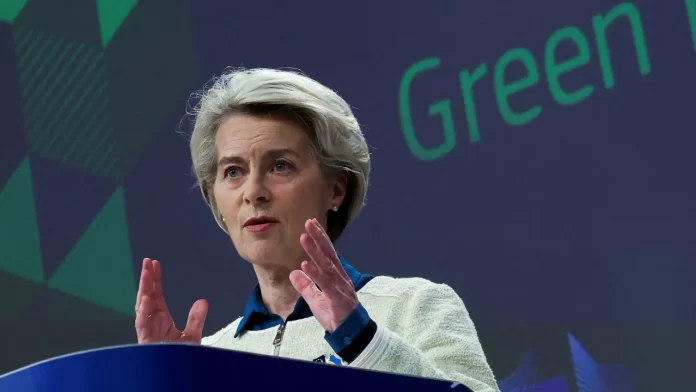When Russia’s full-scale invasion of Ukraine broke out, Europe already assumed that its countries would face a number of difficulties, CNN informed.
The main issue on Europe’s agenda remains the refusal of Russian gas. Countries fear that Russian President Vladimir Putin will cut off natural gas supplies in response to Ukraine’s support.
The energy security of any country is fraught with risk. This is a compromise with cheap imports on one side of the scale and risk of dependence on the countries that supply this energy – on the other. And Europe is no exception.
It was assumed that the long and cold winter of 2022-2023 would force EU countries to reconsider their attitude towards Moscow, since none of the countries could allow their citizens to freeze for the sake of Ukraine if supplies were cut off.
The situation had to be changed. The first step to get rid of dependence on Russia was to reduce imports. In 2021, a year before the full-scale invasion of Ukraine, 45% of all gas imported by the EU came from Russia. In Germany, this figure was 52%. Since then, these numbers have plummeted. According to the EU, in the first quarter of 2023, Russia accounted for only 17.4% of all imported gas.
The second step was to prepare for the cold season of 2023-2024. During the warm winter in Europe, countries have managed to stock up on natural gas so much that Moscow will no longer be able to use it as a lever of pressure. The European Union has achieved its goal: by mid-August, the vaults were filled by 90%, several months ahead of the November 1 deadline.
However, despite the efforts, officials and analysts fear that no matter how impressive the EU’s achievements, Europe’s energy supply without Russia remains in doubt.
The biggest concern is that while all of Europe has diversified its gas imports, most of what is currently in reserve is liquefied natural gas (LNG), says Milan Elkerbout, a research fellow at the Center for European Policy Studies.
“LNG is such an obvious solution that it became the priority, but because LNG is also so flexible and tradable it’s a bit harder to trace the provenance. That means indirectly some of the LNG can come from Russia still so contribute to their revenues.”
The EU says most of its LNG comes from the US, Qatar and Nigeria. However, such gas can often be seen on exchanges, where contracts are concluded without mentioning the origin of the goods.
However, the long-term nature of such a decision is even more worrying. Though Europe has partially abandoned the Change through Trade policy with Russia, it still depends on other types of energy resources.
One of the ways to solve the problem is what the EU calls the Green Deal. This is an ambitious plan aimed at making Europe the first climate-neutral continent by 2050. Thanks to large-scale investments in renewable energy and environmentally friendly transport, it is planned to take a number of measures, such as planting 3 billion new trees and reconstructing buildings to improve energy efficiency.
The first step towards implementing the plan will be to reduce greenhouse gas emissions in the EU by 55% by 2030 compared to 1990 levels. However, critics are increasingly concerned that such slow progress towards this goal will force some to turn their attention to another foreign source of assistance in the energy transition: China.
EU Commission President Ursula von der Leyen recognises that many of Europe’s long-term plans would be best achieved in partnership with China, including its ambitions to create a green Europe.
Von der Leyen’s position reflects the divergence of views among the 27 EU member states. Some are extremely belligerent and see China as a security threat. Some consider it an obvious source of cheap solar panels, wind turbines and batteries. Others do not see an alternative to cooperation with China, but they want to act with caution.
The threat, some say, is that China has already become a strategical key player in the technologies and critical raw materials needed for the transition to a green economy. Adam Bell, a former UK government energy official, shares this view.
“China began its industrial strategy for green energy about 15 years ago. They’ve done it so well, securing natural resources like lithium for batteries, steel for wind turbines, and already built the manufacturing capacity to make all this gear.”
Many Western officials have pointed to more direct security threats posed by Beijing if Europe ends up relying on it in the transition to the green economy. Among the threats is the possibility of direct cyber attacks via Chinese technologies.
However, China, in turn, has repeatedly denied its involvement in cyber attacks.
It should be noted that China is not the only threat to Europe’s energy security. The EU imports energy from many countries pursuing other democratic and geopolitical goals: Qatar, Saudi Arabia, Kazakhstan, Libya and Russia.
One European diplomat, commenting on energy dependence on other countries, said the following:
“It is one of life’s ironies that the countries holding the cards in energy are sometimes ones who are at best unreliable partners and at worst future enemies.”
